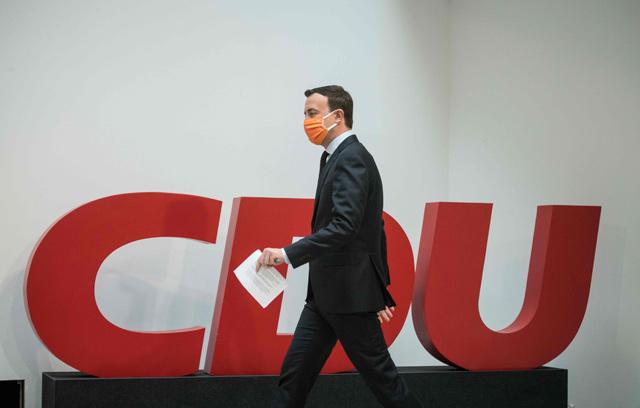- International News
- Tue-2020-10-27 | 04:50 pm

German Chancellor Angela Merkel’s CDU Party said on Monday it would push back a congress planned for early December to elect a new leader due to a surge in coronavirus infections.
The conservative party’s top brass will reexamine the situation in mid-December to determine its next steps, general secretary Paul Ziemiak said.
"Going by the current situation, a congress with attendees on December 4 would not be allowed,” said Ziemiak.
The CDU was still hoping to hold an in-person congress at a later date rather than a video conference, but acknowledged that the online format might be the only option if the pandemic cannot be brought under control.
Merkel protegee Annegret Kramp-Karrenbauer took over as the leader of the Christian Democratic Union in 2018, after the veteran chancellor said she would not seek a new mandate at general elections next year.
But the race for the party’s top job was thrown wide open when Kramp-Karrenbauer resigned just a few months into the post over her handling of a regional election scandal.
The chief of the CDU traditionally leads it and its smaller Bavarian sister party the Christian Social Union to the polls.
The chosen candidate would have a claim on the post of chancellor and be in pole position to replace Merkel should the conservative bloc win next year’s election.
Three men are currently vying for the job — Armin Laschet, state premier of Germany’s most populous state North Rhine-Westphalia, corporate lawyer Friedrich Merz and foreign affairs expert Norbert Roettgen.
But their battle has been overshadowed by the pandemic.
All three are anxious to regain the media spotlight, particularly as a fourth potential replacement for Merkel has emerged — not from the CDU, but from sister party CSU.
Bavarian state premier and CSU leader Markus Soeder has repeatedly stressed that his place is in Bavaria. But his tough attitude on halting virus transmission has won him plaudits.
In contrast, former favourite Laschet, 59, has lost momentum as he took a different approach to Soeder’s hardline clampdown in Bavaria to halt the march of the virus.
Merz, a 64-year-old millionaire and old Merkel rival, is popular with the CDU’s most conservative faction.
But he has found little support for his ultra-liberal positions at a time when unprecedented state intervention is desperately required to prop up the economy.
Centrist Roettgen, 55, a former environment minister dismissed by Merkel in 2012 who is now the head of the German parliament’s foreign affairs committee, has also struggled to get attention.
The latest opinion poll on who Germans would like to see as their next leader has Soeder topping the charts far ahead at 52 per cent — more than 20 points distant from any of the three CDU contenders.













